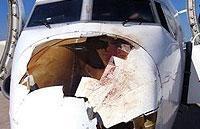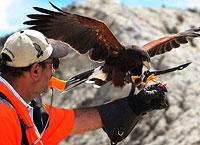The Bird/Wildlife Aircraft Strike Hazard (BASH) deals with the impacts associated with bird and wildlife strikes by both military and civilian aircrafts. These strikes usually happen when aircraft are flying at low-levels and can cause serious damage to the aircraft and can compromise safety for those on board.
Thousands of birds strikes happen annually, yet only about 20% are reported. This inhibits aviation organizations from working collectively to develop effective risk management practices. These risk management strategies can include: use of various radars and technology, understanding of various bird species and their habits, implementation of corrective practices and making use of a Wildlife Hazard Assessment to reduce habitat for birds who are commonly struck.

Using radar helps to reduce bird strikes by detecting the movement of birds at various levels in the sky. The data collected from radar is also used to create environmental management strategies to reduce the attractiveness of common flying areas to birds, therefore reducing the number of bird strikes.
There are many ways to correct the attractiveness of flying sites to birds including; removing unused equipment used as perching sites, using perching deterrent devices on equipment that cannot be removed, wiring water areas with light electrical currents to scare birds, cleaning up brush and tree remains, pyrotechnics, falconry, as well as implementing a continually-changing grass moving program.

Finally, it is essential to identify which species of birds are most often involved in strikes. This is best done but submitting the remains of birds that have been involved in strikes (particularly blood samples and feathers) for analysis. Once a species is identified, aviation professionals can investigate the particulars of the species and create a plan to reduce their presence.













